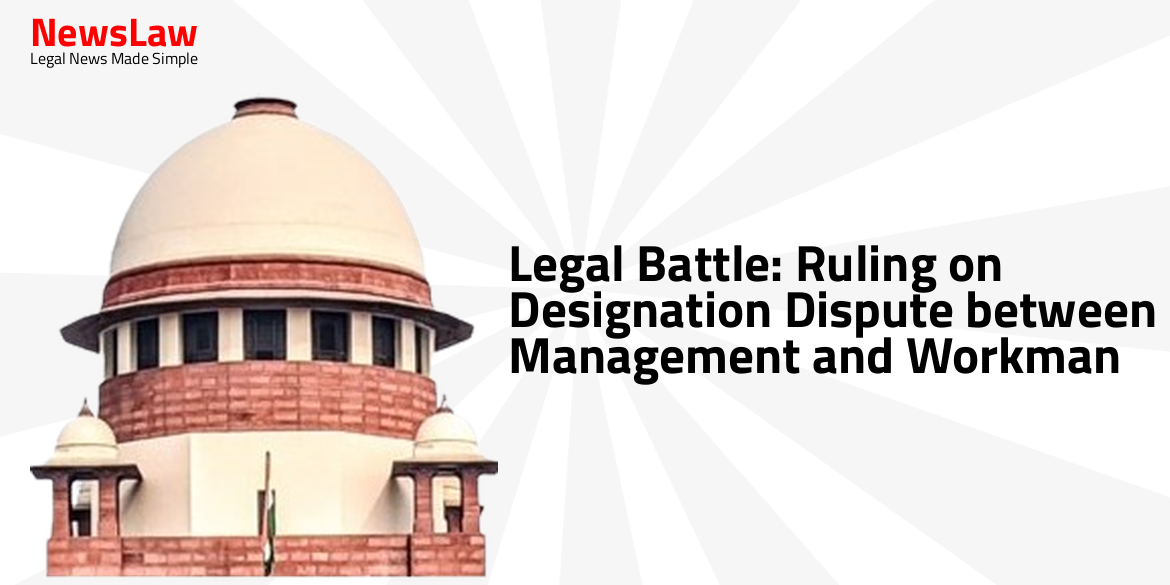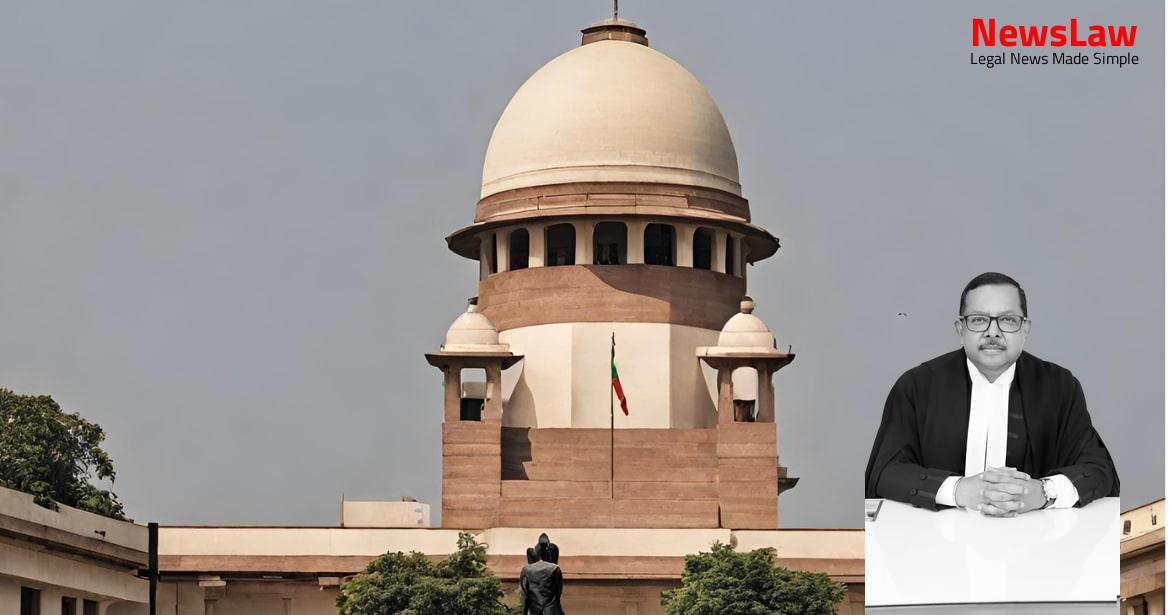In a significant legal battle, the Delhi High Court has pronounced its judgment on the designation dispute between the management and the workman. The Court’s decision addresses the intricacies of retrenchment compensation and notice pay, while also considering the implications of previous industrial tribunal awards. Stay tuned to understand the implications of this ruling on industrial dispute resolutions.
Facts
- The workman failed to object to the designation of ‘unskilled’ throughout their employment.
- The judgment of the Industrial Tribunal did not designate the workman as ‘skilled’ as per the scheduled employment rates.
- The workman was always paid according to the salary prescribed for an unskilled worker.
- In cases such as ‘Chamundi Mopeds Ltd. vs Church of South India Association’ and ‘National Agricultural Cooperative Marketing Federation of India Ltd. vs Commissioner of Income Tax, Delhi-XI’, the facts were different and not applicable here.
- The urgency for a stay was not demonstrated by either party during the proceedings.
- The learned Labour Court found that Sections 9A and 25-N of the Act did not apply to the case.
- The claimant had not worked with the management from the date of transfer until the date of rejoining, so retrenchment compensation under Section 25-F should only be for the actual period worked.
- The transfer of 20 workers, including the claimant, was declared illegal by the POIT, but the decision was stayed by the High Court of Delhi.
- The service of the claimant was retrenched after several years of the stay order, making it unjust to include the period from transfer to rejoining in the total period of working for calculating compensation.
- The Labour Court granted the claimant a compensation of Rs. 200,000 plus interest, ruling in favor of the worker and against the management.
- Reinstatement was not an option as the management was closing down, so the claimant was entitled to wages of skilled or semi-skilled category.
- The management calculated retrenchment compensation based on the last drawn salary of the claimant, not considering the skilled and semi-skilled designations granted by the POIT in 2009.
- The argument for inadequate retrenchment compensation due to the designation case decision by the POIT was rejected by the Labour Court.
Issue
- Issue No 2: Whether the stayed award of the Industrial Tribunal could be relied upon by the learned Labour Court to hold the respondent entitled to compensation.
- The Workman was receiving the salary of ‘unskilled’ labor from the date of appointment until the time of retrenchment.
- The question before the Court is whether the award of the Labour Court needs intervention under Article 226 of the Constitution of India.
Arguments
- The petitioner argues that the award passed by the Labour Court was based on an award dated 29 September, 2009, which was stayed by the Court in November 2013.
- The petitioner’s contention is that the compensation should be calculated based on the worker’s service period of 16 years for retrenchment benefits.
- The petitioner alleges that the workman was willing to perform duties but was kept away from the job without valid reasons.
- The petitioner asserts that the Labour Court erred in not considering the mala fide intention in the payment of retrenchment compensation.
- It is argued that the petitioner did not object to being paid as an unskilled laborer during his service with the management.
- The petitioner further argues that the Industrial Tribunal’s award from 2009 was in effect when the worker was illegally retrenched in 2010.
- The petitioner contests that the impugned award was passed without considering all facts and circumstances.
- The petitioner contends that the workman formed a union for grievances, which led to unfair treatment by the management.
- The petitioner maintains that the Labour Court was correct in passing the impugned award and that the writ jurisdiction should not reevaluate the evidence.
- The petitioner argues that setting aside the 2009 award would nullify the current impugned award in the designation matter.
- The Respondent (Ld. ARM) argued against granting designation to the claimant, stating that retrenchment compensation and notice pay were correctly calculated based on last drawn wages and not as per a previous award.
- Previous case filed by the claimant against transfer resulted in a decision by POIT that the claimant was performing unskilled work.
- The award from the previous case was not contested by the claimant before any forum, making it final and operating as res-judicata.
Analysis
- The Labour Court held that the management erred in calculating notice pay and compensation as per the 2009 award, violating Section 25-F of the Act.
- The attendance register showed that the management didn’t have 100 employees during that period, contradicting the claim of surplus work.
- The workman failed to present evidence against the seniority list and the designation awarded by the Industrial Tribunal in 2009.
- The Court rejected the argument that the 2009 award was stayed; compensation was rightly based on the skilled/semi-skilled designation.
- The POIT decision on transfer legality did not impact the current designation issue, as noted in the seniority list and POIT findings.
- The claimant’s continuous service of over 20 years established eligibility for compensation based on his skilled role, not unskilled labor.
- The findings indicated that the petitioner’s retrenchment was illegal due to failure in paying compensation as per the designated role.
- The Court found no error in awarding compensation as per the earlier designation despite the stay mentioned in the 2013 ruling.
- The evidence presented and factual scenario led to the rightful compensation decision by the Labour Court.
- The Court’s detailed scrutiny and consideration of the facts validated the compensation awarded to the claimant based on the industrial tribunal’s designation.
- In the case of Nava Bharat Ferro Alloys Limited v. Transmission Corporation of Andhra Pradesh Limited, the principle of restitution entitles the successful party to be restored back to the position it would hold had there been enforcement of tariffs.
- The party losing in the final decision, after being successful at the interim stage, must compensate the successful party and restitution should be made to restore the parties to the same position before the interim decision.
- In State of Rajasthan v. J.K. Synthetics Limited, interest on royalty was stayed by interim orders, and upon dismissal of the writ petition, the interest became due unless there are special reasons.
- Imposition of a stayed law during proceedings is inoperative upon its quashing, and parties should be restored to their pre-stay positions unless specified otherwise by the court.
- The distinction between quashing and suspension of a law is crucial, as the former removes the law entirely while the latter keeps it in abeyance.
- The court’s duty is to put parties in the same position they would have been in if the stayed order had not been imposed.
- Section 25-F of the Industrial Disputes Act lays down conditions for retrenchment of a workman.
- Employer must give one month’s notice or pay wages in lieu of notice for retrenchment.
- Employer must pay compensation equivalent to fifteen days average pay for every completed year of continuous service or any part thereof in excess of six months at the time of retrenchment.
- Notice to appropriate government is required for a valid claim for compensation under this Section.
- Workman must have been in continuous service for at least one year with the employer to be eligible for compensation.
- The Court finds no merit in the petitions and upholds the Labour Court’s findings.
- The petitioner management has failed to present any convincing arguments in their favor.
- Similar findings were made in other connected matters where the management was found to have illegally retrenched workers without proper compensation.
Decision
- The issue before the Labour Court was the legality and justification of the workman’s retrenchment.
- The management is directed to pay Rs.2,00,000/- to the workman within one month, with a 9% interest rate if not paid on time.
- Each party is to bear their own costs.
- The award is to be sent to the Government of NCT of Delhi for publication.
- The file is to be archived in the record room.
Case Title: SAWHNEY RUBBER INDUSTRIES Vs. SH. KRISHAN KUMAR (2024:DHC:4569)
Case Number: W.P.(C)-6524/2020



